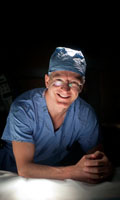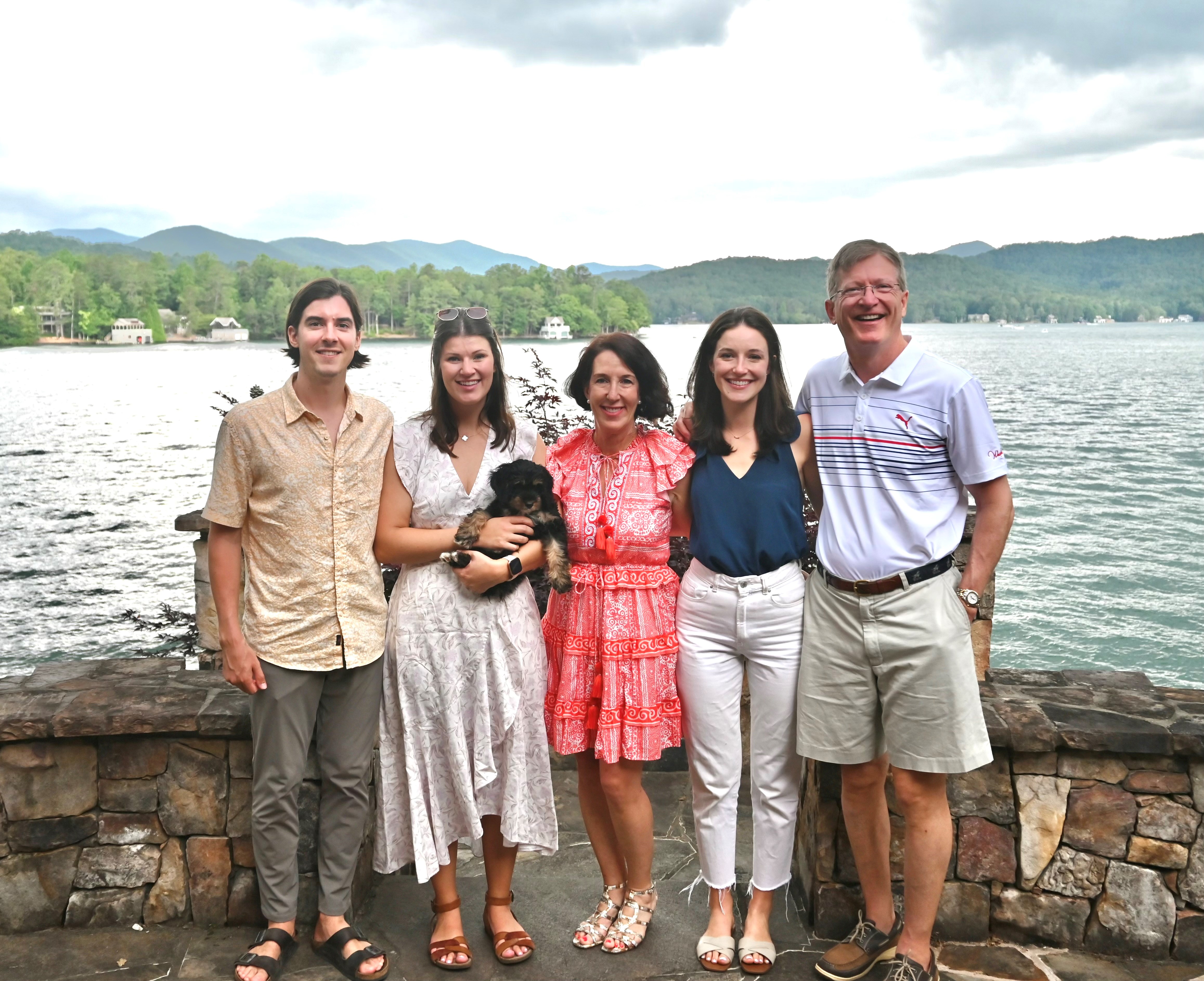Although he’s widely regarded now as one of the world’s most preeminent experts on coronary surgery, John Puskas, MD, might have trod down a very different medical path had it not been for one simple twist of fate.
Over Thanksgiving break of his second year at Harvard Medical School, the then-neurosurgery-focused Puskas was too broke to go home for the holidays. “I didn't have two nickels to rub together, I was so buried in student debt,” he explains.
While others waved their goodbyes and made their travel plans, he was sitting in his empty dorm, looking for ways to stave off boredom, when another medical student suggested – hey, why don’t you go check out a surgical operation?
That led Puskas down to Massachusetts General Hospital, a place he had not yet visited – where he promptly got lost trying to find the Department of Surgery. As he wandered around in the early morning hours, dressed in his neatly pressed white coat, a resident came up to greet him and asked if he was the medical student who had asked to observe an operation that day.
“I said, ‘How did you know it was me?’ He said, ‘You look really lost,’” Puskas recalls.
As it turned out – the operation in question that day was a coronary bypass operation. Once Puskas laid eyes on the heart up close – and the way that those surgeons worked on it in the operating room – the rest was history. He would go on to complete his residency at Mass General and then arrived at Emory for cardiothoracic surgical training.
Fast forward to this spring, and Puskas has made an illustrious homecoming to Emory Heart & Vascular. This time, as Chief of Cardiothoracic Surgery at Emory University Hospital Midtown – moving back to Atlanta after 10 years in New York City, where he served as Chairman of the nationally ranked Department of Cardiovascular Surgery at Mount Sinai Morningside Hospital.

Puskas started in his new leadership role at Emory this April.
He will also partner with William Nicholson, MD, to lead Emory Healthcare’s Complex Coronary Revascularization program, and play a pivotal role in the growth of clinical trials and clinical research within the division and Emory Heart & Vascular.
We caught up with Puskas to chat about what drives him each day, what his hopes are for this Emory role, and why practicing medicine is all about embracing constant change.
Emory: When you were a kid, what did you envision yourself doing when you grew up? Were you always science-y?
Puskas: I was always a science nerd for sure. Math and science and biology fascinated me. The human body is by far the most complex machine that we could ever hope to examine or redesign or repair.
Emory: What’s the most surprising or unexpected facet of this long and storied career that you've built for yourself?
Puskas: I've had the great privilege of never being bored. I have been frequently exhausted, sometimes frustrated, occasionally in despair, but never bored. We have the privilege of working to the limit of our physical endurance, doing something that is inherently worthwhile, trying to do battle with some of the most lethal conditions known to humankind using our hands and our wits.
It is a compelling vocation that really has been more rewarding and all-consuming than I could have ever anticipated.
As I participated in so many innovations over the years, I also realized that very little of what I do in the operating room is as I was taught to do it. Over the course of one not yet completed career lifespan, the field has evolved tremendously. I've had the privilege of taking part actively in that evolution through innovation and clinical trials and surgical science. To be able to say that when I complete my career, almost nothing I do will be exactly as it was a generation ago – that’s a good thing.
The balance between meeting the standard of care and optimizing the care for an individual patient, while innovating and advancing the field for all patients, that's a balancing act that is also very engaging because it is so challenging, and the stakes are so very high.
Emory: What are your biggest accomplishments – personally and professionally?
Puskas: Professionally, I started off as a cardiothoracic surgical trainee wanting to learn and do everything and believing I could learn and do everything. But the field continues to expand.
The total volume of knowledge and the complexity of all these different procedures becomes so immense, so difficult, that to achieve real excellence, which is the baseline expectation of the public, and it should be, one must specialize. I have begun to focus over these last 20 years of my career more and more on coronary surgery.

Puskas and his family at Lake Burton.
My most important personal accomplishment is I have been married to a wonderful woman, Jane Puskas, DMD, for 38 years and we have three wonderful children, Alex, Jillian, and Caroline.
Emory: What are you most excited about in assuming these new roles with Emory Heart & Vascular?
Puskas: I think that the key is to continue to push for improvement in what we do for patients. It's a sacred trust that patients and their families place in us. They’ve trusted their lives to the team to do coronary bypass surgery for them. Each family has brought one of the people they care most about in the world and entrusted that person to us with permission to open their chest and operate on their heart.
There’s an extraordinary leap of faith and a granting of trust that we receive with each one of these coronary patients. And it's therefore our obligation to not just do a perfect job for each patient, but to improve that job over time for the next generation of patients. We can't end our career doing what we did when we began our career. It has to become better, and we have to play a leadership role in that here at Emory.
Emory: Now that you’re back here, what is one thing that you're going to desperately miss about New York as a city, and then one thing that you just couldn't get anywhere else besides Atlanta that you're looking forward to having access to again in the city?
Puskas: Well, I'll miss running in Central Park. With Atlanta, it’s the gracious people, and the dogwoods last weekend were gorgeous. I’m happy to be back.
Emory: From what I gather, you and your wife do a lot of globe-trotting. What is one place that you've not had a chance to go to yet that's on your bucket list?
Puskas: I'd like to go fishing in Patagonia.
Emory: What made you want to return to Emory? What got you back here?
Puskas: That gets back to my personal achievement, which is family, and my wife Jane. We have been married for 38 years, and Jane is a very accomplished dentist. We met at Harvard. She was in the dental school, I was in the medical school, and we became study buddies during the first two years of basic sciences. She has a very successful practice in Buckhead and was the president of the Hinman Dental Society, which is based here in Atlanta.
When I was in New York working at Mount Sinai, Jane flew from Hartsfield (Jackson International Airport) to LaGuardia every Thursday at 3 p.m. and back every Monday at 6 a.m., probably 40 weeks of the year, for what we thought might be a short time and turned into 10 years. And then we decided enough was enough.
I've been back at Emory now since April 2, which was 10 years plus two days from the day I left. We're rekindling friendships with people that we knew for 25 previous years that we lived in Atlanta. It’s been a great reentry.
From a professional point of view, it's the opportunity to be back here at Emory advancing the great work of my predecessors and mentors in cardiac surgery and cardiology. Also, to work in this new service line system that Joon Lee, MD, is bringing forward at Emory Healthcare. I am incredibly excited and inspired by that vision, which I believe will elevate Emory to new heights of leadership and service in healthcare.

